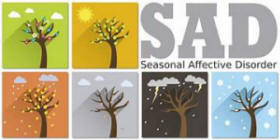Depression
You can't give up on yourself
 Types
of Depression
Types
of Depression
Major Depressive Disorder
Major Depressive Disorder (MDD), characterized by persistent feelings of sadness and loss of interest or pleasure, is the most common form (American Psychiatric Association, 2013Individuals with MDD often experience changes in appetite, sleep disturbances, fatigue, and difficulty concentrating. Other types include Persistent Depressive Disorder (PDD), Bipolar Disorder, formerly known as dysthymia, Persistent Depressive Disorder (PDD) represents a chronic, long-term form of depression lasting for at least two years (American Psychiatric Association, 2013). While the symptoms may be less severe than MDD, their persistent nature can significantly impact daily functioning
Seasonal Affective Disorder
Seasonal Affective Disorder (SAD), and Psychotic Depression.
Seasonal Affective Disorder (SAD) follows a seasonal pattern,
typically occurring during fall and winter when there is less
natural sunlight (American Psychiatric Association, 2013). Symptoms
include low energy, irritability, and changes in sleep and appetite.
Symptoms often begin in the fall, as days start to get shorter and continue through the winter. Symptoms include:
- social withdrawal
- increased need for sleep
- weight gain
- daily feelings of sadness, hopelessness, or unworthiness
Psycotic Depression
. Psychotic Depression combines depressive symptoms with features of psychosis, such as hallucinations or delusions (American Psychiatric Association, 2013). This subtype often requires a combination of antipsychotic medications and antidepressants for effective treatment.
Symptoms of psycotic depression can be as severe as those of major depression and include:
- sadness
- anxiety
- anger or rage
- exhaustion
Bipolar Disorder
Bipolar Disorder involves alternating periods of depressive episodes and manic episodes (American Psychiatric Association, 2013). During depressive phases, individuals experience symptoms similar to MDD, while manic phases are characterized by elevated mood, increased energy, and impulsive behavior.
Other Signs include:
- high energy
- reduced sleep
- irritability
- racing thoughts and speech
- grandiose thinking
- increased self-esteem and confidence
Atypical Depression
Depression that momentarily disappears in reaction to happy occasions is referred to as atypical depression. It may be referred to as an atypical major depressive illness by your doctor.
Atypical depression is neither uncommon nor rare, despite its name. It also doesn't imply that it's any more or less severe than depression of other kinds. It might be especially difficult to deal with atypical depression since you might not always "seem" miserable to other people or to yourself. It can also occur in cases of chronic depression or during a major depressive episode.
Other Symptoms include:
- heightened hunger and gaining weight
- eating disorders
- negative body image
- Sleeping a lot more than usual, experiencing sleeplessness
- feeling heavy in your arms or legs for at least an hour a day
Home | Types | Effects | Treatments | References